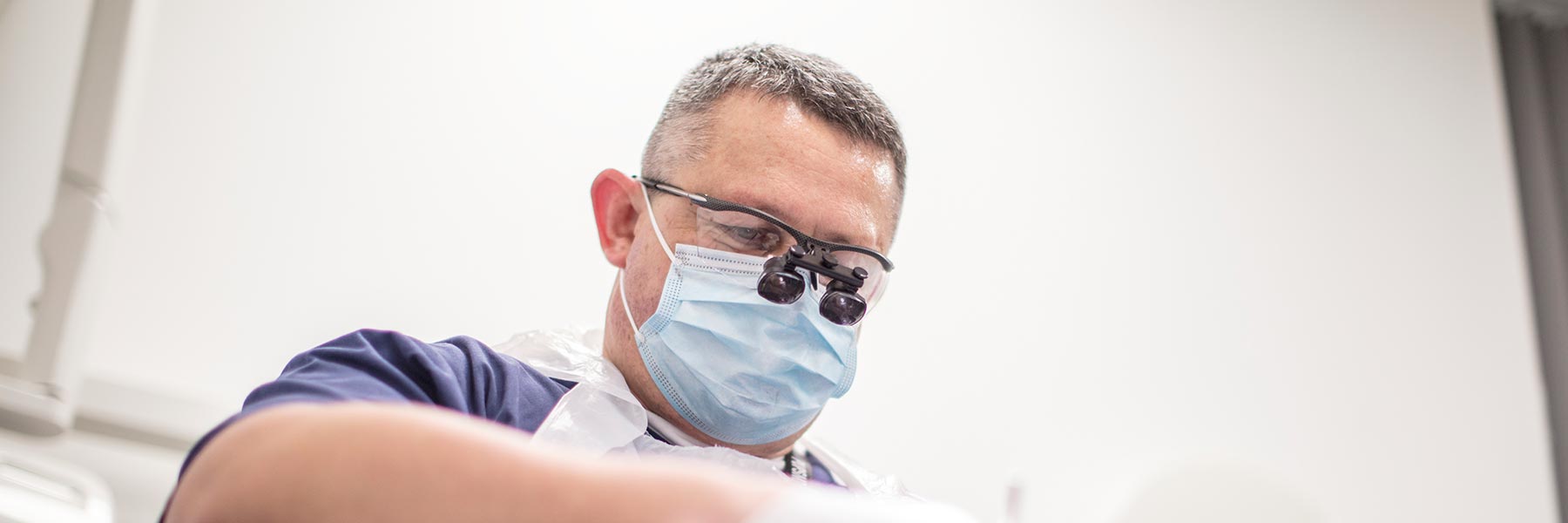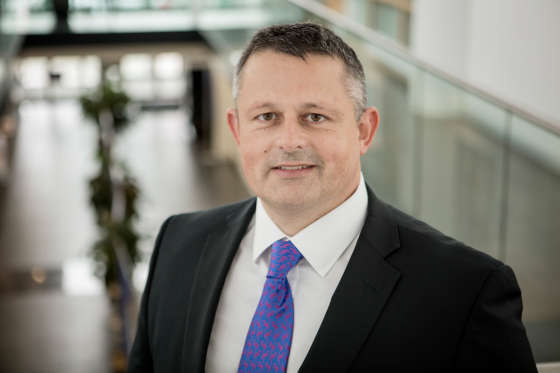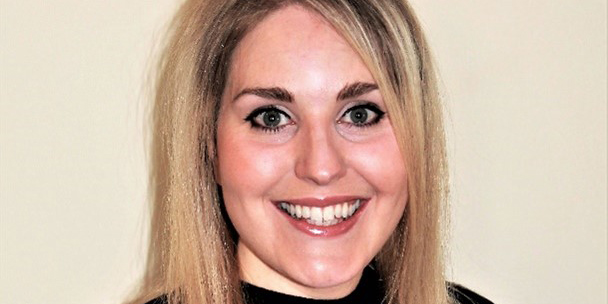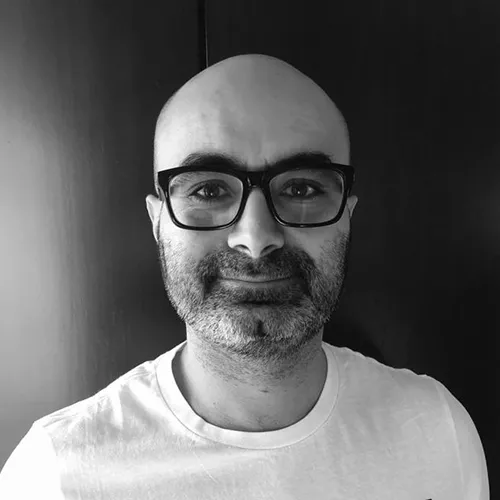
MSc Restorative Dental Science
Delivered by the Peninsula Dental School for registered dental practitioners, our MSc in Restorative Dental Science will help you perform advanced restorative treatments with increased skill and confidence.
Course details
This course is not running in September 2023. Future start dates are to be confirmed.
Delivery
online, part-time
Duration
2 years
Total fees
£24,995 (flexible payments available)
Please note that fees are reviewed on an annual basis. Fees shown are the most up to date but still subject to change in exceptional circumstances.
Course overview
Restorative dentistry incorporates the mono-specialist disciplines of endodontics, periodontics, prosthodontics, and implant dentistry.
Our programme is designed to provide busy dental practitioners like yourself with the opportunity to study in a flexible manner, so you can continue your clinical work and learn at the times that suit you best.
Hear from Course Leader, Dr Timothy O'Brien as he answers key questions on what makes the course exciting, career pathways, and studying online.
Read the transcript for this video
Want to watch the full Q&A? Register to gain access.
This MSc recognises the growing demand for dentists with a special interest and enhanced skills in restorative dentistry. The skills you gain will help elevate your career options, which could include providing care for more challenging cases.
You will receive the expert support needed to strengthen the quality of your practice, and the chance to apply your newly acquired techniques and knowledge to your own patients in real time.
During your time on the course, you’ll master how to perform more proficient case assessments, diagnoses, and treatment planning. Of course, we’ll also equip you with the techniques and knowledge needed to perform more clinically advanced treatments of patients requiring restorative dentistry.
"You can begin to employ the techniques that you learn on your own patients from the outset, putting into practice what you've learnt in the modules as you undertake them."
Mr Timothy O'Brien, Course Leader
What you’ll study
Created by restorative dentistry specialists with vast experience in postgraduate education and assessment. This course will teach you how to conduct complex restorative treatments that are underpinned by a strong evidence base. As you develop your knowledge of the theories and concepts behind the practice, you’ll gain the expertise needed to bring an added dimension of understanding and analysis to your work.
You will:
-
explore dental issues and procedures with increasing complexity, while learning how to perform them safely and with confidence
-
develop an in-depth understanding of your own work and how to critically evaluate your own decision making
-
dive into deeper development of your practice, including key competencies for future career advancement.
Why study an MSc in Restorative Dental Science?
With new methods, best practices and technologies continuing to shape the field of dental science, it’s more important than ever for dentists to enhance their skillset to adapt. Learn more about how this online Masters can advance your career in this video.
Module overview
You’ll explore the basic science underpinning common disease processes relevant to restorative dentistry, which affect the teeth/hard tissues, and the materials used to restore/replace dental tissues which have been affected.
Find out more about what you can expect from the first module.
The focus of this module is the diagnosis and management of caries and tooth surface loss, including the use of direct restorations.
This module focuses on the diagnosis and management of periodontal and endodontic pathology. You’ll gain a deeper understanding of the principles behind the prevention of and treatment for endodontic and periodontal pathology, including the role of surgical intervention.
In this module, you’ll learn more about the principles of restoring teeth using indirect restorations, and the replacement of missing teeth using different types of prosthesis.
This module will help you develop your evidence-based dentistry skills through the completion of an evidence synthesis project. You will design, plan, and undertake a review of the evidence relevant to your chosen field of study.
Are you interested?
Entry requirements
If your application is successful, your place will then be allocated on a first-come, first-served basis.
You should have a Bachelor of Dental Surgery (BDS) or equivalent.
We would also like you to have a GCSE (or equivalent) in Maths or English at C Grade or above.
This programme requires you to be actively practising dentistry, so we will make sure you’re also meeting the requirement(s) of your relevant regulator for indemnity/insurance.
We also require candidates to be competent in English. If English isn’t your first language, we’ll ask that you meet an IELTS of 7 (with a minimum of 6.5 in each element) or equivalent in a secure English language test.
We recommend that all students have access to their own technology to access their programme including the right hardware (for example, a laptop), software and connectivity (for example, broadband).
As the online programme will be using the University of Plymouth’s digital learning environment, applicants will be made aware of the technical and connectivity requirements, which are outlined here.
Careers and opportunities
An MSc in Restorative Dental Science showcases your continued commitment to learning and honing your professional skills. You’ll be able to demonstrate a deep understanding of the anatomy and physiology of the oral hard and soft tissues relevant to restorative dentistry.
You’ll also be able to showcase an in-depth understanding of the aetiology and diagnosis of common diseases of the oral hard and soft tissues. Finally, you’ll have a critical and systematic understanding of the behavioural, clinical and technical procedures involved in the management of patients requiring restorative dentistry.
These abilities will not only equip you for future promotions and career opportunities in wider areas of dentistry, but also help you provide quality care for your patients.
As an online student and after you graduate, you’ll have access to the Peninsula Dental School Alumni+ Dentistry Network. Through this network, you can connect to current students, academic staff and alumni worldwide and get updates on the latest online and in-person events and career development opportunities.
Find out more about how the course can enhance your career in dentistry:
The Peninsula Dental School
The School is committed to three core aims: outstanding clinical education; strong social engagement; and world class research. Staff are committed to addressing today’s most challenging healthcare issues and helping dental practitioners apply what they learn immediately in a clinical setting.
The School is part of the Plymouth Institute of Health and Care Research (PIHR), bringing together academics from Dentistry, Medicine, Nursing, Psychology and other health-related disciplines.
The PIHR conducts world-leading research into areas such as: Transformation in life course, ageing, methodologies, e-health, technology and interventions in health, social care, lifestyle, health and wellbeing.
How the online programme is delivered
This course teaches you advanced restorative techniques, underpinned by a rigorous appraisal of the evidence base, so that you gain the skills to practise critically and effectively in your own dental practice. This is a hands-on course and you will be encouraged to apply your learning to your clinical work, throughout your studies.
As well as seminars, tutorials, and self-directed learning in context, the programme also includes interactive application of the learning to real-life clinical dilemmas.
The MSc in Restorative Dental Science runs over two years. We recommend you dedicate a minimum of one day a week to your studies, but this can be split across evenings or weekends to suit you. The programme consists of five modules using a variety of learning techniques depending on the academic subject matter, such as:
How you’ll be assessed
You’ll be evaluated based on your ability to case assess, diagnose, create treatment plans and appropriately manage patients requiring restorative dentistry in the primary care setting. This will involve a variety of assessments, culminating in a final research dissertation.
You will not need to do any written exams. Your theoretical understanding will be assessed by multiple choice questions.
Important information regarding access to patients
Please be aware of the following:
- You will need access to adult patients, requiring Restorative Dental care, throughout the course
- These patients will need to consent to the use of anonymised images and radiographs of them being used by you, as part of your coursework
- Not only will this help you to put your new knowledge straight into practice, but you will need this clinical activity in order to complete the assignments.
The course uses a mixture of assessment types which require access to patients, including:
-
Case reports; detailed reports of one or more patients, including photographs and radiographs
-
Reflective logbooks; a "diary" of clinical work, including short descriptions and a selection of photographs and radiographs.
It is important that you ensure that you retain access to patients for this purpose throughout the course, across the full range of restorative dentistry (periodontology, endodontics and prosthodontics) and that they consent to the use of their anonymised records for this purpose.
Catch up with Plym
See allWhy study an MSc in Restorative Dental Science?
Find out how an MSc Restorative Dental Science can help you develop your knowledge and...
Meeting your patient needs with fixed and removable prostheses
Find out how an MSc in Restorative Dental Science can help you develop your ability to assess and...
Gain enhanced skills to meet increased demand for endodontic care
Find out the benefits for your dental practice of enhancing your skills and knowledge in the area...
Video transcripts
[MUSIC PLAYING] - So the actual teaching and learning is delivered through online medium through both sort of seminars things like that, but also self-directed learning, which is pretty much what you'd expect as master's level.
When it comes to the practical side, we do offer hands-on days and things like that. But they're not actually part of the core curriculum, so they aren't compulsory for people to do. And, in fact, you know, obviously, attending things like that there's extra costs. So they're a sort of [? bolt-on ?] that the really keen students if they want to do them they can do them, but it's not actually part of the course itself.
- And can I just ask in regard to those, would the practical days, those sort of add-ons that you mentioned, would they involve coming to Plymouth itself?
- Yes. They are run in Plymouth or Exeter, which is about 3/4 of an hour up the road.
- OK. That makes sense. So we do you have one more question that I think we should deal with now. Would this course be suitable for someone living overseas?
- I think of all the courses, it's eminently suited to someone living overseas really. I mean, obviously, studying any master's from the UK, there are language issues. And so we try and be realistic about the entry requirements for that. But the nice thing about this course is that you can study it sort of in your own time zone, as it were.
You don't have to attend physically on site, which makes life so much easier for people. They're not having to pay a huge amount in travel, and also having to take days out at a time. I mean, quite often, when people attend for the hands-on days, they'll sometimes need to spend previous half a day traveling to places in the UK quite easily. Well, we don't do that. Because if it's accessible online, we've cut that out. So yeah.
[MUSIC PLAYING]
I think as far as it goes, you've got to remember that this is one of a suite of courses that we do. And I think it's fair to say that any provider that provides a number of courses continually develops them and adjusts them and learns an awful lot from it. I've been involved in all sorts of different courses over the years, sort of full-time specialty training courses, blended learning and things like that. And having experience in these different things just helps make courses slightly better in terms of how they work.
The whole idea behind this course is really about teaching people the science behind things. So realistically, any dentist from any background can benefit from things like that. But the thing to remember is, is it's a master's course, and it's very much focused on master's level skills.
So this isn't just a question of giving someone a series of lectures. We teach them to go out, to look at the literature, to be able to read papers and understand them and then apply them as well in the sort of discussions and things that we have, which is a really, really important thing. Otherwise, it's no difference. It's just sort of buying a book, frankly.
So I think there are some of the things that differentiate it. And of course, not everywhere does that. You will find courses like diplomas and certificates, which just simply produce rote teaching for people. And they're not actually teaching them at master's level and equipping them with those skills.
[MUSIC PLAYING]
First of all, having an MSc certainly tends to enhance the employability of graduates. So, say, for example, they go for a job maybe. They decide to move into private practice or things like that, then having an MSc in Restorative Dentistry has shown that it really does impress employers, things like that. So from that aspect, it can certainly help people. It doesn't guarantee you'll get the job because it does depend on the rest of your CV and things like that. But it certainly does help.
Within the UK, we have things more advanced care pathways. So we're introducing a different tier of clinical work that's between speciality work and general practice. So it's effectively advanced general practice. And interesting enough, things like MScs in Restorative Dentistry are one of the criteria that they actually look for when appointing people to do things like that.
The other thing we hear from our students is quite often, once people know they're studying for something like this, and they've got a little way through it, that they'll begin to get more referrals from colleagues with their own sort of network, things like that. So that can help benefit people. But I think there are other skills as well.
For example, if you want to become involved in teaching or research or things like that, as more and more dentists do as they sort of form portfolio careers, then things like the MSc can help with developing skills and getting jobs as they think-- these sort of areas, too.
[MUSIC PLAYING]
I think the things that make it stand out are, one, the flexibility it offers, which as we said before, with people who come from other countries. Things like that has proven to be very useful. But it's the same with other people who are working in the UK as well. Having that flexibility is a really good selling point for them as it were.
[MUSIC PLAYING]
- I would say that the most successful students that I've spoken to have been in regular contact with me because we are here to help. We can get things to admissions. We can advise you. We can do everything for you on that sort of end about getting your application in. We can refer you to English language tests and things like that if they're necessary. So definitely speak to your course advisor and perhaps take heed of our advice if we give it to you.
I would also say ensure that you can manage the time commitment. We have been talking about this quite a bit. But this is a serious qualification, and it requires a serious level of commitment for that reason. You will be working 20 to 25 hours per week on top of your normal work for two years, and it's a large commitment. But it is the kind of commitment you need to make if you want to get this high level of qualification and benefit your career and your practice with that.
And I would say just as a final bit on our end, apply early, get your offer early, and enroll early because it's the way that everything goes smoothly. And it just sort of-- it sets you off on the right foot for your journey with us at Plymouth.
[MUSIC PLAYING]
5 reasons to do a restorative dental science degree.
1. Keep up-to-date with dental practices
The use of evidence-based dental care is increasing, and cutting-edge technologies are being introduced at a rapid rate. To be successful now and into the future, dentists need to keep up-to-date with these developments.
2. Become an expert in restorative dentistry
You’ll be able to draw upon your learnings to effectively assess and identify the best solutions and techniques in addressing your patients’ diverse range of individual needs and complexities.
3. Apply data-backed techniques to your practice
You'll gain the insights and knowledge to make the distinction between which methods and techniques purport to ‘revolutionise’ dentistry, and which are actually grounded in data-backed evidence.
4. Learn from dental specialists and consultants
You’ll have access to expert advice and support from specialists and consultants in the field. You can then immediately apply the insights you gain from the leading industry professionals delivering your course to your dental practice.
5. Learn skills you can apply throughout your career
You’ll have the tools you need to successfully take your practice to the next level, now and into the future. It’s also this expert skillset that will future-proof your career as a dental professional and ensure your continued success.
Our online, part-time Restorative Dentistry Masters degree fits into your schedule as a busy dental professional.
Have questions?
Our course adviser team is here to help. Get in touch today for further information on the MSc in Restorative Dental Science.
Tel: +44 (0) 23 9438 7959
Email: onlinecourses@plymouth.ac.uk
[relaxed music plays throughout]
Module snippet
Caries, tooth surface loss, direct restorations
Aws Alani
Module Leader and Associate Professor in Restorative Dentistry
Aws Alani: In this module, you'll be learning about the management of both caries and tooth service loss as well as teeth whitening.
I think that this module is quite unique in that we will be looking at the research supporting contemporary minimally invasive dentistry. Clearly this is quite important to us in that we want to retain as much tooth structure as possible without compromising the dental pulp.
Your assessment in this module will be formulated of a reflective logbook of cases and the case report of a patient you've personally treated.
Largely, a lot of these conditions are increasing. We're seeing a lot of patients developing quite severe, significant surface loss that is best treated through additive resin composites. In addition to that, I think that now with evidence that we have available to us, the management of caries is also quite minimally invasive. By utilising resin adhesives, to sealant bacteria and reduce the amount of tooth tissue that we remove to improve the function and aesthetics of our dentistry.
Start something big today.
We’ll get in touch to discuss your area of interest and answer any questions. Just fill in the details below:



